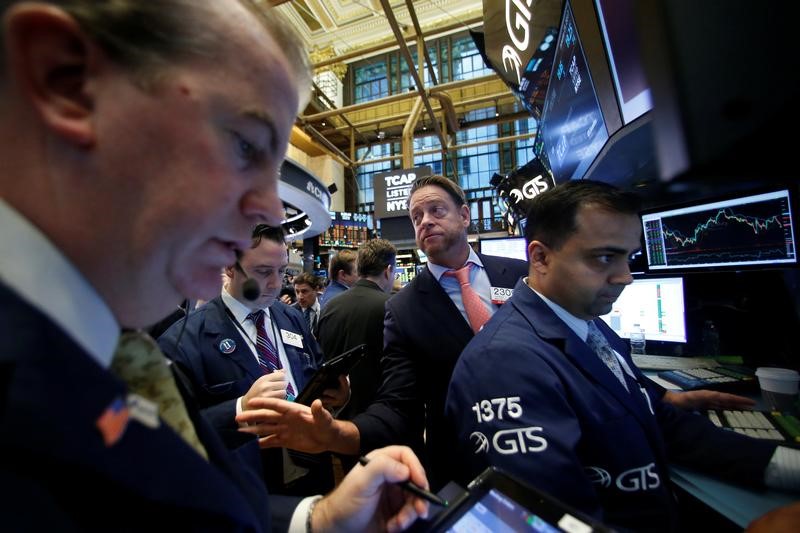By Claire Milhench
LONDON (Reuters) - Global investors raised their U.S. equity holdings to an 18-month high in January, betting fiscal stimulus from U.S. President Donald Trump will spur growth, but doubts are growing whether he can deliver as much as markets have priced in.
A Reuters monthly asset allocation poll of 47 fund managers and chief investment officers in mainland Europe, the United States, Britain and Japan showed U.S. equity holdings at 41.8 percent of investors' global equity portfolios - the highest level since June 2015.
But Tuesday's survey, carried out Jan. 16-30, also suggested markets may have overcooked the "reflation" trade.
U.S. stock markets hit record highs in January (SPX) (IXIC) on expectations that Trump's promises to push through $1 trillion in tax cuts and public spending would boost corporate earnings and fuel economic growth.
"The U.S. equity market does look expensive, but a positive economic outlook and revenue-driven earnings growth are keeping investors' appetite ...buoyant," said Peter Lowman, chief investment officer at UK-based wealth manager Investment Quorum.
However, 55 percent of poll participants who answered a question on Trump's fiscal stimulus plans thought they would fail to meet existing market expectations, while protectionist measures were seen posing a threat to global trade.
"Financial markets have priced in a degree of good news about an upturn in the global economy," said Andrew Milligan, head of global strategy, Standard Life (LON:SL) Investments. "A major risk therefore is that markets are surprised by how aggressive the Republicans are on trade and immigration matters."
Immigration curbs announced by Trump triggered an equity sell off on Monday, with world shares posting their biggest daily fall in 1-1/2 months (MIWD00000PUS).
PROTECTIONIST RHETORIC
Trevor Greetham, head of multi-asset at Royal London Asset Management (RLAM), said Trump's unpredictability could create risks in markets if his protectionist rhetoric began to take precedence over the promise of stimulus.
"Recent pull-backs in the dollar and U.S. equities suggest some investors are unwinding their Trump trades," he added.
Mouhammed Choukeir, chief investment officer of Kleinwort Hambros, questioned whether Trump could deliver on a guarantee of annual economic growth of 3.5 percent.
"That level of growth has not been hit in the U.S. for over a decade, and wildly pumping fiscal stimulus into the economy will do nothing to address fundamentally poor demographics – made worse by immigration curbs – or slowing productivity," he said.
A Citi analysis of Trump's actions in his first few days in office concluded that while measures such as the entry restrictions against seven majority-Muslim countries were grabbing attention, not all had material relevance for markets or the U.S. economy.
BONDS CUT
Overall, equity holdings rose to 45.8 percent of global balanced portfolios, the highest since May 2016, the Reuters poll showed.
Bond allocations meanwhile fell to 39.9 percent, a four-month low. Cash holdings were steady at 5.4 percent.
Within their fixed income portfolios, investors rotated out of U.S. bonds into the euro zone, reflecting the fact that the U.S. Federal Reserve has signaled further interest rate hikes while the European Central Bank remains committed to its bond-buying program.
U.S. bonds fell to 36.3 percent of investors' fixed income portfolios, the lowest since October 2016, and euro zone bonds rose to 27.9 percent, a four-month high.
Some 60 percent of respondents who answered a question about the pace of Fed tightening expected to see one to two rate rises in 2017, while just over a third thought there could be three hikes. In mid-January, Fed chair Janet Yellen warned of the dangers of allowing the U.S. economy to run "hot".
Investor uncertainty over the pace of tightening largely stemmed from the difficulty in forecasting how successful Trump would be at getting his fiscal stimulus package through a fiscally conservative Republican-led Congress.
Matteo Germano, global head of multi-asset investments at Pioneer Investments, expects at least two rate hikes in 2017, but reckons more are possible if fiscal stimulus causes "overheating of an economy already running at full employment".
Patrick Moonen, principal strategist in the multi-asset team at NNIP, also plumped for two hikes in 2017, and four in 2018.
"If the U.S. were to engage in large-scale fiscal expansion this would very likely lead to strong dollar appreciation and a rise in the trade deficit," Moonen said.

"Both would increase the risk that the Trump administration will focus more on protectionism."